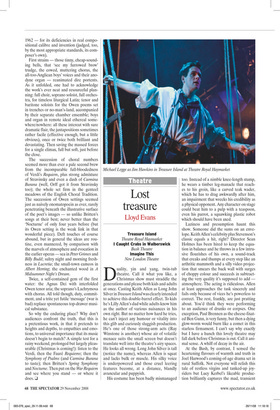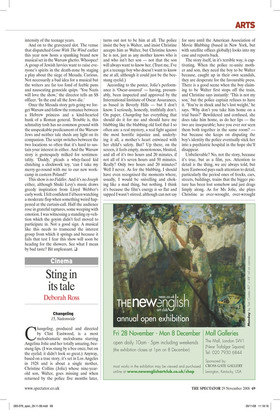Lost treasure
Lloyd Evans
Treasure Island Theatre Royal Haymarket I Caught Crabs in Walberswick Bush Theatre Imagine This New London Theatre
Duality, yin and yang, twin-tub theatre. Call it what you like, a Christmas show must straddle the generations and please both kids and adults at once. Casting Keith Allen as Long John Silver in Treasure Island was clearly intended to achieve this double-barrel effect. To kids he’s Lilly Allen’s dad while adults know him as the author of various nuisances in his own right. But no matter how hard he tries, he can’t inject any humour or vitality into this glib and curiously sluggish production. He’s one of those strong-arm acts (Ray Winstone is another) whose air of volatile menace suits the small screen but doesn’t translate well into the theatre’s airy spaces. He looks all wrong. Long John Silver is tall (notice the name), whereas Allen is squat and lacks bulk or muscle. His silky voice is underpowered and those cruel leering features become, at a distance, blandly avuncular and puppyish.
His costume has been badly mismanaged too. Instead of a nimble knee-length stump, he wears a timber leg-manacle that reaches to his groin, like a carved teak wader, which he has to drag awkwardly after him, an impairment that wrecks his credibility as a physical opponent. Any character on stage could beat him to a pulp with a teaspoon, even his parrot, a squawking plastic robot which should have been axed.
Laziness and presumption haunt this show. Someone did the sums on an envelope. Keith Allen’s celebrity plus Stevenson’s classic equals a hit, right? Director Sean Holmes has been hired to keep the equation in balance and he throws in a few intrusive flourishes of his own, a sound-track that creaks and thumps at every step like an arthritic mammoth and a silly video projection that smears the back wall with surges of choppy colour and succeeds in subtracting the very quality it’s supposed to add — atmosphere. The acting is ridiculous. Allen at least approaches the task sincerely and fails only because of vices he’s powerless to correct. The rest, frankly, are just pratting about. You’d think they were performing to an audience of drunks or corpses. One exception, Paul Brennen as the cheese-fixated Ben Gunn, is very funny, but then a dying glow-worm would burn like a comet in this starless firmament. I can’t say why exactly but I have a hunch this lovely theatre may fall dark before Christmas is out. Call it animal sense. A whiff of decay in the air.
At the Bush, by contrast, I sensed the heartening flavours of warmth and truth in Joel Harwood’s coming-of-age drama set in rural Suffolk. Not everyone will relish this tale of restless virgins and tanked-up joyriders but Lucy Kerbel’s likeable production brilliantly captures the mad, transient intensity of the teenage years.
And on to the graveyard slot. The venue that dispatched Gone With The Wind earlier this year now hosts a spanking brand new musical set in the Warsaw ghetto. Whoopee! A group of Jewish luvvies want to raise everyone’s spirits in the death-zone by staging a play about the siege of Mesada. Curious. Not necessarily a bad idea for a musical but the writers are far too fond of feeble puns and nauseating genocide quips. ‘You Nazis will love the show,’ the director tells an SS officer. ‘In the end all the Jews die.’ Once the Mesada story gets going we forget Warsaw and follow the romance between a Hebrew princess and a kind-hearted hunk of a Roman general. Trouble is, this schmaltzy tosh has no common ground with the unspeakable predicament of the Warsaw Jews and neither tale sheds any light on its companion. The script switches between the two locations so often that it’s hard to sustain your interest in either. And the Warsaw story is grotesquely milked for sentimentality. ‘Daddy,’ pleads a whey-faced kid clutching a clockwork toy, ‘can I take my merry-go-round with me to our new workcamp in eastern Poland?’ This show is no Fiddler. And it’s no Joseph either, although Shuki Levy’s music draws greedy inspiration from Lloyd Webber’s early work. I felt confident I’d been watching a moderate flop when something weird happened at the curtain-call. Half the audience rose in grateful raptures, some weeping with emotion. I was witnessing a standing oy-vehtion which the goyim didn’t feel moved to participate in. Not a good sign. A musical like this needs to transcend the interest group from which it springs and because it fails that test I fear this show will soon be heading for the showers. See what I mean by bad taste? Bit unpleasant. ❑



































































































 Previous page
Previous page